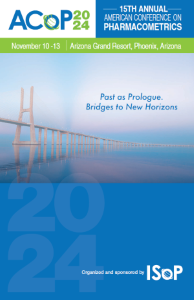The Practical Bayesian: How Bayesian Methodology is Incorporated into Clinical Drug Development
Applying Bayesian Methods for Dose Optimization in Pediatric Oncology: Leveraging from Adult Population Pharmacokinetics
Wednesday, November 13, 2024
2:45 PM - 3:15 PM MST
Location: Sonoran Sky Ballroom 1-4

Nastya Kassir, PharmD, PhD, FCP (she/her/hers)
Senior Director & Distinguished Scientist
Genentech
San Francisco, California, United StatesDisclosure(s): No financial relationships to disclose
Speaker(s)
Disclosure(s):
Nastya Kassir, PharmD, PhD, FCP: No financial relationships to disclose
The targeted application of Bayesian methods in clinical pharmacology has transformed the way we approach pharmacometric challenges in pediatric oncology. The principle of leveraging existing data from adult population to refine pediatric dosing strategies is crucial in mitigating the complexities associated with pediatric clinical trials and with the lack of data in this population (0-18 years). This presentation will focus on the application of Bayesian methods in pharmacometrics to address this issue by leveraging knowledge from existing adult population pharmacokinetic and exposure-response models. The key objective of this work was to achieve a target exposure in the pediatric population that emulates the established therapeutic adult dose, informed by population pharmacokinetic and exposure-response models developed from adult trial datasets, to determine the recommended phase 2 doses in pediatrics. In this presentation, we will share how the population pharmacokinetic models were used with the emerging pediatric pharmacokinetic data, allowing for an adaptive approach that accommodates developmental differences and growth. Adopting Bayesian methods in this context not only provides dynamic predictive tools for precision dosing in pediatric oncology but also promotes the broader application of Bayesian techniques in clinical drug development.

